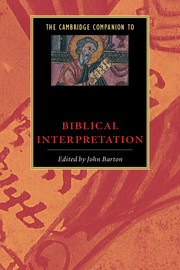Book contents
- Frontmatter
- Introduction
- Part 1 Lines of approach
- 1 Historical-critical approaches
- 2 Literary readings of the Bible
- 3 The social world of the Bible
- 4 Poststructuralist approaches New Historicism and postmodernism
- 5 Political readings of Scripture
- 6 Feminist interpretation
- 7 Biblical studies and theoretical hermeneutics
- 8 The Bible and Christian theology
- 9 Biblical study and linguistics
- 10 Aspects of the Jewish contribution to biblical interpretation
- 11 The Bible in literature and art
- Part 2 Biblical books in modern interpretation
- General Index
- Index of Biblical References
9 - Biblical study and linguistics
from Part 1 - Lines of approach
Published online by Cambridge University Press: 28 May 2006
- Frontmatter
- Introduction
- Part 1 Lines of approach
- 1 Historical-critical approaches
- 2 Literary readings of the Bible
- 3 The social world of the Bible
- 4 Poststructuralist approaches New Historicism and postmodernism
- 5 Political readings of Scripture
- 6 Feminist interpretation
- 7 Biblical studies and theoretical hermeneutics
- 8 The Bible and Christian theology
- 9 Biblical study and linguistics
- 10 Aspects of the Jewish contribution to biblical interpretation
- 11 The Bible in literature and art
- Part 2 Biblical books in modern interpretation
- General Index
- Index of Biblical References
Summary
Linguistics as the 'science of language' is concerned not just with the description of individual languages in and for themselves (though these provide essential data) but with abstract and general questions that arise from language as a universal human phenomenon. The theoretical issues involved in the study of language and of the processes in the mind and in the environment which enable learning and communication have many ramifications; psychological, sociological and philosophical.
The Bible, as a library of literary works written in three original languages, Hebrew, Aramaic and Greek, and translated in whole or in part into some 2,000 'receptor' languages, inevitably raises questions posed by linguistics at both the practical and the theoretical levels. Most biblical interpreters approach these questions pragmatically. They are concerned with a range of practical tasks and it is through the effort to discharge these tasks that they are most likely to encounter the underlying theoretical issues. For example, the problems involved in translation, one of the most challenging areas of linguistic theory and practice, are inescapable already in New Testament interpretation, for the version of the Hebrew Scriptures largely presupposed in the New Testament is already a translation, the Greek Septuagint from the second century BCE. And, since no-one is a native speaker of classical Hebrew, imperial Aramaic or koine Greek, the problems of translation from 'source' to 'receptor' language confront the interpreter of the Bible at every turn as the attempt is made to transpose words and content out of the original language into the idioms of the interpreter's everyday speech. Formally or informally, on paper or just in the mind, the anglophone has to convey in English what the text of the original says and it is that process which marks the definitive stage in the decision about the meaning of what is written in the ancient language.
- Type
- Chapter
- Information
- The Cambridge Companion to Biblical Interpretation , pp. 129 - 142Publisher: Cambridge University PressPrint publication year: 1998



